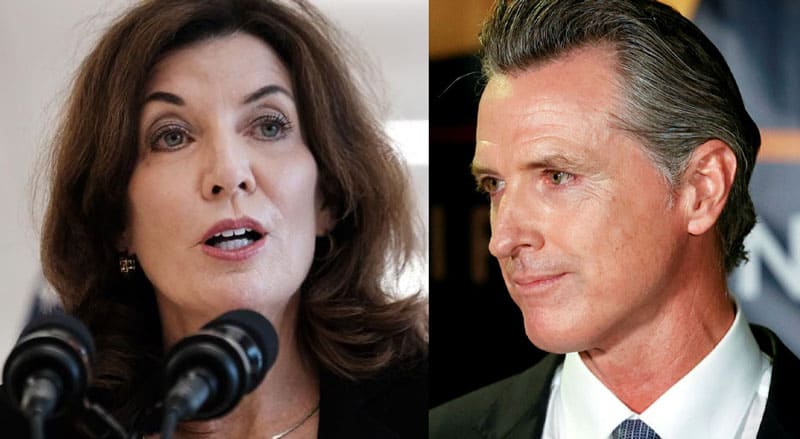New York State has announced that it will be joining California in banning the sale of gas-powered cars from 2035.
New York’s Democrat Governor Kathy Hochul made the announcement during a press conference.
Hochul said that all new sales of cars, pickups, and SUVs in the state must be either fully electric or plug-in hybrids starting in 2035.
Meeting the 2035 target will be staggered, Hochul revealed.
The law will require that 35 percent of new cars, pickups, and SUVs must be zero-emission by 2026 and 60 percent by 2030.
“New York is a national climate leader and an economic powerhouse, and we’re using our strength to help spur innovation and implementation of zero-emission vehicles on a grand scale,” Hochul said.
While the plan outlined by Hochul mostly follows California’s zero-emissions scheme, New York’s extends to public transportation, including school buses.
All new school buses in New York will be required to be zero-emission by 2027.
The entire fleet must meet the stringent new standards by 2035.
In her announcement, Hochul also said New York would be rolling out a range of financial incentives to encourage residents to buy electric vehicles, along with investments in related infrastructure, including fast-charging stations.
New York is the latest state to adopt the zero-emissions measure after California announced in August (pdf) that it would prohibit new sales of gas-powered cars by 2035, with the same staggered adoption milestones.
“We had to wait for California to take a step because there’s some federal requirement that California had to go first,” Hochul said.
“But once they made that decision, we were able to step up immediately and say ‘now there’s nothing holding us back’.”
After the California Air Resources Board unveiled the gas-powered car ban, the states of Washington and Massachusetts announced that they, too, would follow suit.
After California rolled out its gasoline-powered car ban, Sen. Marco Rubio (R-FL) took aim at the scheme, arguing that it’s marred by “hypocrisy” and “silliness.”
Rubio told reporters at a press conference in West Palm Beach, Florida, on Sept. 16, that due to continued reliance on fossil fuels to generate electricity to charge electric vehicles (EVs), California’s scheme is “self-defeating.”
“If they’re going to go to all battery-powered cars, then I guess they’re going to be charging their cars with coal and natural gas because that’s how you produce electricity because they don’t like nuclear plants,” Rubio said.
“And I don’t think you can generate enough power for a state like California based on solar and wind. So, in the end, it’s self-defeating,” the Republican senator continued.
Rubio added he believes electric vehicle technology will continue to advance and the day will come when there’ll be more of them on American roads.
But market mechanisms—not government dictates—should be the driving force behind widespread electric vehicle adoption, he said.
Other critics of California’s aggressive zero-emission-vehicle sales standards have warned that a lack of key electric vehicle infrastructure makes adoption of California’s new rules “extremely challenging.”
“Whether or not these requirements are realistic or achievable is directly linked to external factors like inflation, charging and fuel infrastructure, supply chains, labor, critical mineral availability and pricing, and the ongoing semiconductor shortage,” John Bozzella, president and CEO of the Alliance for Automotive Innovation, said in a statement.
He added that he and the organization he leads fully backs the aim to get more electric vehicles on the road, but there are policy issues that need to be addressed before that can succeed.
“The questions policymakers should be asking: Are critical mineral and battery supply chains in place?” Bozzella said.
“Will the critical mineral mining and processing happen in the United States? Can customers afford the vehicles?
“Do all communities have the same access to level 2 home charging as single-family homeowners?
“Resolving these questions will determine the ultimate success of the California regulations and the EV transformation.”
As Slay News reported earlier, the president of Toyota, Akio Toyoda, also warned that meeting the new standards may prove more “difficult” than lawmakers believe.

Our comment section is restricted to members of the Slay News community only.
To join, create a free account HERE.
If you are already a member, log in HERE.